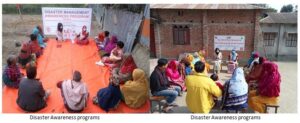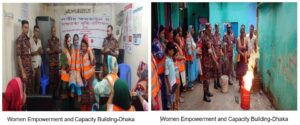Dhaka Community Hospital Trust, Community Initiative Society (CIS) and Asia Pacific Alliance for Disaster Management (A-PAD-Bangladesh) jointly organized emergency health camps for the Cyclone Mora victims 2017 in Cox’s Bazar areas.
Cyclone Mora hit the south-eastern coast of Bangladesh at early morning on 30 May 2017. The Cyclone had maximum sustained winds of 92 km per hour and gusts of up to 135 km. At least six people were killed and destroyed thousands of homes. One of the worst affected areas is around the port of Cox’s Bazaar, which has a large number of Rohingya refugees. The main economical sources fisheries and agriculture field were destroyed for this cyclone. Some 300,000 people had been moved to safety or were evacuated on 29 May 2017 as the delta nation braced for its first strong cyclone of the year. More than 1,000 shelters were set up in several districts, including Cox’s Bazar and Chittagong. Many of the 22,000 people on Cox’s Bazar’s Moheshkahli Island, where 10,000 people died in a cyclone in 1991, moved to shelters.
Dhaka Community Hospital Trust, Community Initiative Society (CIS), Disaster Health and Environment Management Foundation (DHEM Foundation) and Asia Pacific Alliance for Disaster Management Bangladesh (A-PAD-Bangladesh) jointly organized emergency health camps in Shairardail, Moghdail of Matarbari Union and Dhalghat of Dhalghata Union from 31 May 2017. The health camp team consisted of 10 members. More than 2500 patients were treated and provide medicine till now. About 2000 people got health and hygiene education during the health camps.
Early warnings and better preparedness helps local community on saving lives. DCH Trust Matarbari field Office cyclone preparedness programme were out in force before the storm struck, working with local communities to evacuate people from low-lying coastal areas to the safety of cyclone safe shelters.
DCH Trust provides medical support to people living in temporary shelters. Popper preparedness and early warning help to evacuate people with the help from local volunteer. It is more effective when specific weather conditions are anticipated and are likely to impact communities living in certain high risk areas. DCH Trust wants to continue this preparedness program in Coastal areas in Bangladesh




